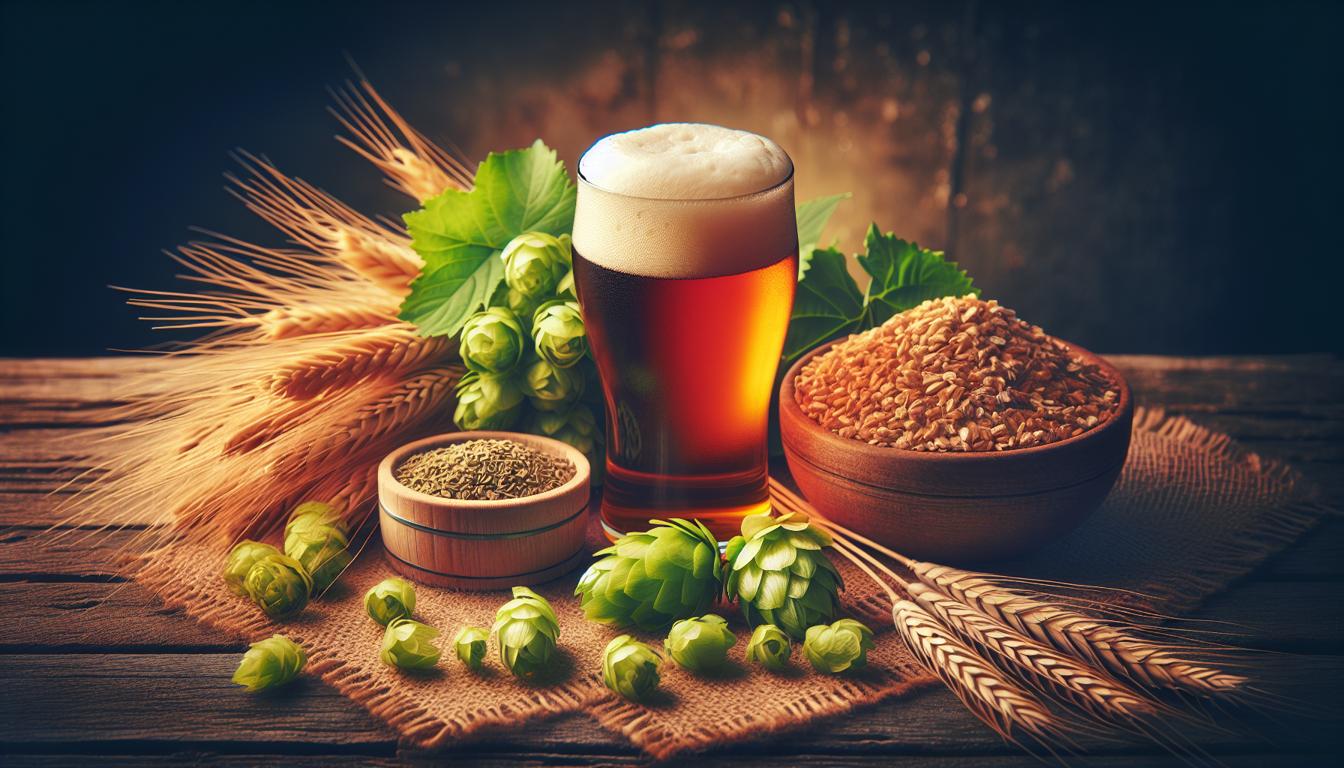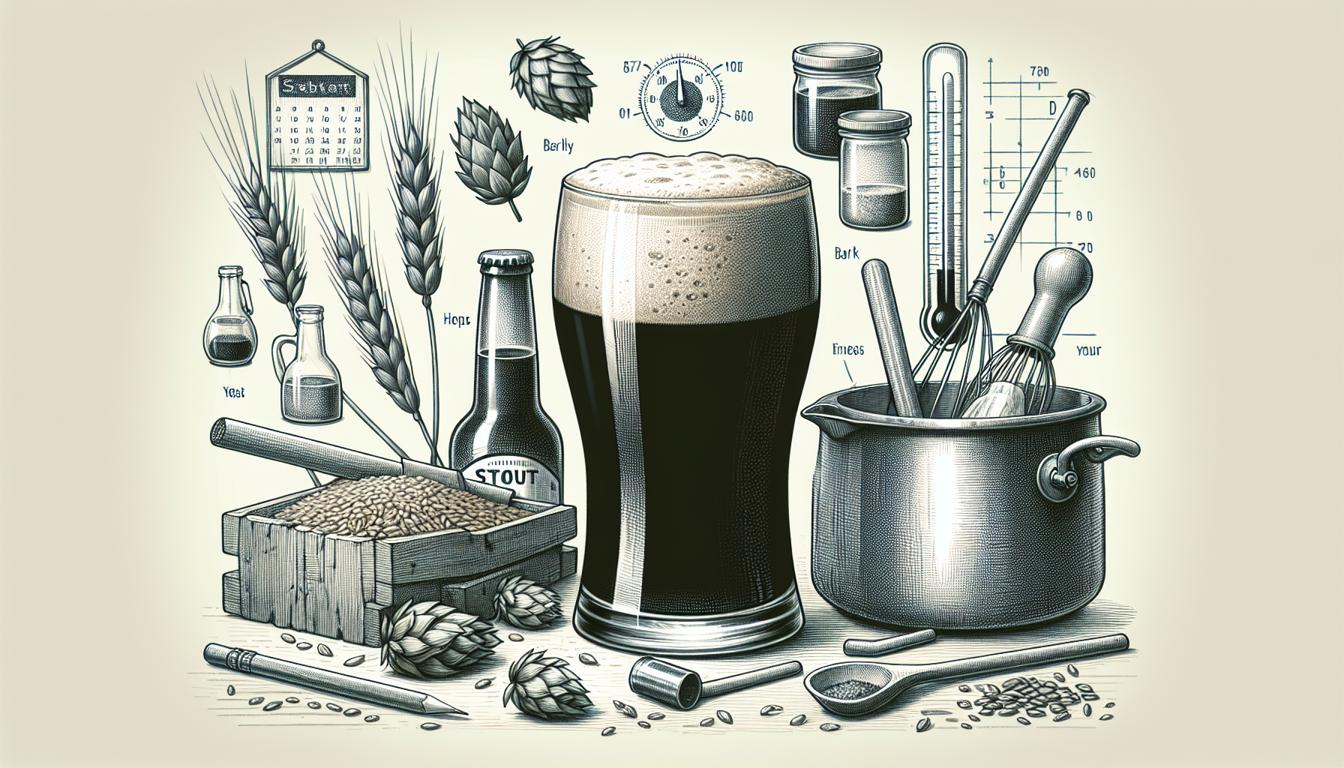There are numerous ways to store hard cider once fermented, and the best method depends on your specific needs.
Once your cider has been bottled, it needs to be stored in a cool, dark place and in proper airtight containers.
Cider stored properly will last everything between 1 to 10 years depending on the alcohol percentage, yeast remains (clarity), carbonation and acidity.
A basement or a cold pantry are good options.
You also want to make sure to use good quality bottles, with either capsules or corks, and storing them upright helps the sediment to stay at the bottom of the bottle, which allows the cider to clear up.
If the purpose of your cider is to be drunk within a year or so you should just store it in a cold place in your house or basement.
However, if you want to store your cider for many years, you need to think a bit more carefully about the storage conditions.
If you want to store your cider to optimize its taste and shelf life, this article will hopefully guide you toward your goal!
What do you store homemade cider in?
Cider is most commonly stored in glass bottles with either a normal capsule or a cork. The corks are usually used when cider is meant for long-term storage as it is considered to be more airtight than a capsule.
Whereas glass bottles are often preferred, you may also store your cider in plastic bottles or even oak barrels if you prefer, and each method will affect longevity and taste differently.
However, do not store your cider in metal containers like aluminum, copper, or iron as these metals will react with the acids of the cider and make it undrinkable!
When you have chosen a storage container for your cider, you also need to consider the closing mechanism for your bottle.
Here, the most popular options are capsules, swing-top lids, and corks.
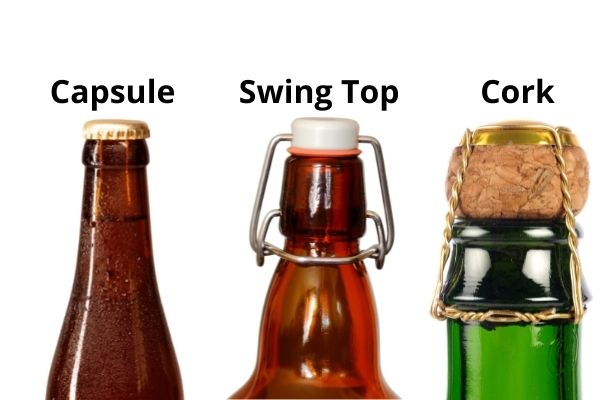
Capsules:
Capsules are a great and cheap way to bottle your cider. They provide a tight seal that keeps the cider fresh and prevents it from leaking. They are easy to apply and allow you to bottle your cider without having to buy expensive corking equipment or swing-top bottles.
Swing-tops:
Swing-top lids are a great option for bottling because they provide a tight seal that helps to keep the contents fresh. They are also easy to open and close, which is convenient when you need to access the contents of the bottle quickly.
Corking:
Corking helps to preserve the cider in the bottle and is actually the best way of preventing oxygen from entering and spoiling the contents.
It also provides the best long-term airtight seal that keeps carbonation in, ensuring that your cider is as fresh and bubbly as when it was first bottled. And it looks quite nice as well…
Screw caps:
Screw caps are another method usually used when storing cider in plastic bottles. These can be beneficial because the bottles are easy to open and close and no special equipment is needed to apply a screw cap.
However, the downside is that the bottles will be more likely to explode upon excessive pressure build-up, whereas a capsule or cork may pop out before the bottle breaks.

Cider can also be stored in larger bottles or demijohns, but make sure to rack the cider before long-term storage to avoid the negative effects of degrading yeast leftovers on the taste!
Read more about other options for cider storage containers in my in-depth post about the topic.
How long does it take to carbonate cider after bottling?
One crucial part of modern cider making is the second fermentation that happens after bottling, which allows carbonation and thus the appealing mouthfeel and taste of a sparkling cider!
Generally, it takes one to three weeks before your cider will be carbonated and ready to drink.
This timeframe might be viewed as the “minimal storage requirements” for cider in order for it to be somewhat drinkable, but most ciders will benefit from a certain aging time of around 3-6 months before drinking.
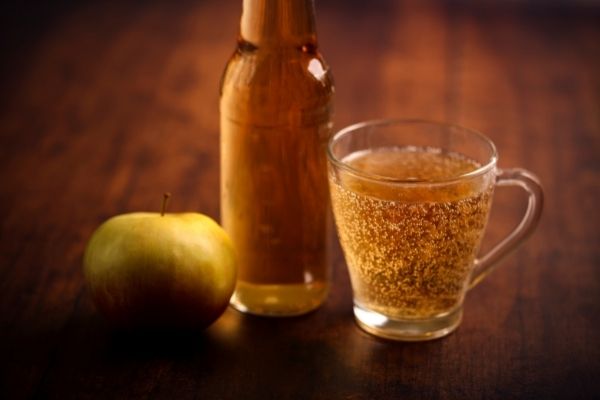
The amount of carbonation you will achieve will also depend on the time of bottling, the initial sugar content, the type of yeast, and the apples used.
For example, a cider bottle while the yeast is still actively fermenting will reach carbonation much faster than a cider that has been racked several times and stored for extended periods in cold conditions.
You may also save the time and effort of bottle carbonation and use a SodaStream or similar to carbonate your cider instead. But non-sparkling or still cider can also be a fabulous drink!
How and where do you store cider after bottling?
The exact way to store your cider depends on what stage it is in and when you want to drink it!
Industrially, cider is stored in large stainless steel tanks or in oak barrels for a while to age the cider before bottling.
But no matter how you store your cider, it is commonly agreed upon that it should be stored cold. Research shows that wine stores well at 50-59F (10-15C) and while no research exists, cider seems to do best slightly below that. I personally store my cider at 50F (10C).
If you are more interested in the best containers to keep your hard cider in I have already written an elaborate post about that topic.
Cellars are generally the best option for long-term storage of cider. They protect your bottles from sunlight and temperature fluctuations, ensuring that your cider will taste its best for years to come.
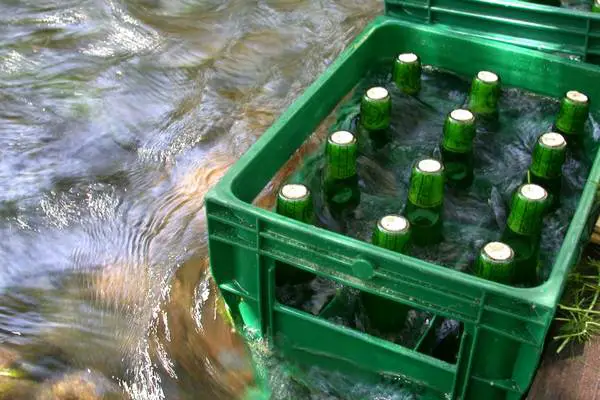
Hard ciders that are stored in a cold environment like a wine cellar will last much longer than those stored above 70F (21C), but this will also depend on the alcohol content and bottle type (capsule or cork) used to bottle the cider.
However, when your cider is already bottled, there are different convenient ways to store it:
1. Normal wine racks: Wine racks are a great way to store cider bottles. They come in all different shapes and sizes and can be made out of wood, metal, or plastic. You can usually find them at your local home improvement store.
2. Cooler cabinets: Cooler cabinets like those used for wine bottles, or simply a fridge, is another good option for storing ciders if you have a limited number of bottles.
They offer more protection than wine racks and can keep your cider bottles organized and dust-free. The regulated temperature eliminates fluctuations and the need for a dedicated storage environment, e.g. a basement, to keep the bottles cold.
3. Pupitre Racks: A pupitre is traditionally used to store champagne bottles before corking, but they are also a popular way to store cider bottles that are intended for corking later on.

They come in all different sizes and can be made out of wood, metal, or plastic. I personally find this storage option the most elegant, but it does require some space and a cold location like a basement to work well!
4. In boxes: Personally, I store many of my cider bottles in wooden boxes. I store them either upside down or upright depending on if I plan to disgorge and cork the cider bottles or not.
5. Underground: Yes you read it right! If you do not have a basement, another way for long-term storage can be to dig down your cider bottles a few feet underground. This will ensure a stable temperature and protection year-round.
Preferentially this should only be done with the ciders protected in a container or thick plastic bag and it should not be done in very cold climates where the soil freezes too deep!
No matter which storage option you choose, be sure to keep your bottles stored upright so that the cork does not dry out and allow air into the bottle, which will ruin the cider. Also, don’t forget to label your bottles so you can keep track of what you have!
Does hard cider go bad if not refrigerated?
No, when it comes to the shelf life of hard cider, you should think of something in between beer and wine.
That is, you can easily store hard cider outside the fridge for months and even years, but you will get a better result and longer shelf life when storing cider in colder conditions.
How long can hard cider be stored?
In theory, some hard cider can be stored for decades and even centuries like some wines can.
However, this will only be the case for highly alcoholic ciders that have been stabilized well with sulfites, filtration, or even pasteurization.
Generally, cider experts recommend that you do not store homemade hard cider for more than 3 years before drinking it, but it depends on the type of cider and the temperature of storage.
Another important factor influencing the shelf life of hard cider is of course the storage conditions. Both the internal “bottle” environment and the external “room” environment will matter a lot for how well the cider ages with time.
If stored in wooden barrels, air will slowly get through to the cider and therefore it is not advisable to store cider for more than a few months like that unless the cider is still actively fermenting.
In that case, the produced CO2 will displace the oxygen and the cider can therefore be stored for longer in a less airtight container.
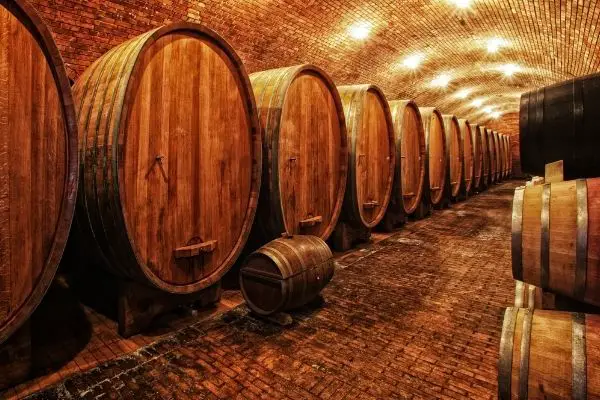
For long-term storage, an airtight bottle and a cold environment is preferred. A storage temperature below 50°F (10C) is usually preferable, but even colder will only extend the shelf life.
However, for optimal development and drinkability, storage at normal basement temperatures is fine if the cider is consumed within a few years after bottling.
Can you put hard cider in the freezer?
In theory yes, but I would never put hard cider in the freezer. If you put a glass bottle with hard cider in the freezer, the cider will expand and shatter the bottle!
However, in a not too full plastic bottle, it might be possible to store the cider in the freezer, but it will likely change the taste of the cider as freezing does destroy some of the aromatic compounds and may rupture some remaining yeast cells to release off-tastes.
Can you store hard cider in plastic?
Yes you can, and most modern PET plastic bottles will not impact negatively on the taste of your cider. Just make sure the lid or capsule is airtight.

In the cider community, it seems that people generally prefer glass bottles as these tend to be more airtight and glass just has a more serious feel to it.
However, if you choose to store your cider in plastic bottles, it does have some advantages:
1. It is cheap: Plastic bottles are often cheaper than glass bottles.
2. It is practical: Plastic does not break as easily as glass. If the plastic bottles have screw lids, it is also easier to store a cider that has already been opened again.
3. It is safe: If the pressure gets too high in a plastic bottle it will not shatter like glass bottles do and will therefore cause less damage. Therefore plastic bottles can be a good option for beginners still trying to get their carbonation right!
How to store cider when opened?
The best way to store cider that has already been open is in as airtight a container as possible. This can be done, for example, by re-applying the capsule or cork.
Storing an open cider is much easier if you already have it in a bottle with a screw lid.
Be careful not to pour the cider into a new container, as it will lose much of its carbon dioxide and thus become flat and boring to drink later on.
How long will cider keep once opened?
If you have opened a hard cider, it can be stored in the fridge for up to around three weeks in an airtight container otherwise the alcohol might oxidize and become sour or bitter.
The problem is, that much of the fizz has properly gone off and oxygen has reached the alcohol, which will inevitably change the taste and mouth feel of the cider.
However, if you are not a picky drinker, you could store the cider for up to a few months before it becomes outright disgusting or dangerous to your health.
What happens when I drink expired hard cider?
Expired hard cider will taste flat and wonky. It’s not harmful to drink, but it’s not going to taste very good either. So if you’re looking for a tasty beverage, stick to fresh hard cider that hasn’t been sitting around for too long.
Drinking expired hard cider that has been exposed to oxygen can be like drinking vinegar as it might go sour or even bitter and smell bad. If you drink the cider at this point, you might find yourself with a sore throat and an upset tummy.
Hard cider usually does not go bad within months and even years, and you can definitely save hard cider for a year or two before drinking it!
But remember, the shelf life of a hard cider really depends on the alcohol content of the cider and the airtightness of your bottles.
A champagne-like cider with a high (>8%) alcohol content stored in a corked bottle will typically last longer than low alcohol (<4%) cider stored in a plastic bottle with a loose screw lid.
And if it tastes or smells off, or has stuff growing on the surface, it is always better to be safe than sorry!


-recipe.jpg)
